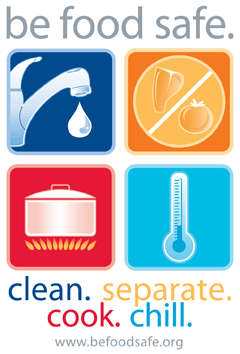Save an Average of 30% or More!
Page Content
Be Food Safe
 The Partnership for Food Safety Education and its government liaisons from the U.S. Department of Agriculture, U.S. Food and Drug Administration, and U.S. Center for Disease Control and Prevention, have joined to create a campaign to bring renewed focus to the four core food safety practices of Clean, Separate, Cook and Chill.
The Partnership for Food Safety Education and its government liaisons from the U.S. Department of Agriculture, U.S. Food and Drug Administration, and U.S. Center for Disease Control and Prevention, have joined to create a campaign to bring renewed focus to the four core food safety practices of Clean, Separate, Cook and Chill.
Food handling safety risks at home are more common than most people think. The four easy lessons of CLEAN, SEPARATE, COOK, and CHILL can help prevent harmful bacteria from making your family sick. To find out more about food safety, visit Be Food Safe.
4 Easy Lessons in Safe Food Handling
-
Clean: Bacteria can spread throughout the kitchen and get on hands, cutting boards, knives and countertops. Frequent cleaning can keep that from happening. And always wash hands with warm water and soap for 20 seconds before and after handling food.
-
Separate: Cross-contamination is how bacteria spreads. Keep raw meat, poultry and seafood and their juices away from ready-to-eat foods.
-
Cook: Even for experienced cooks, the improper heating and preparation of food means bacteria can survive. Use a food thermometer – you can't tell food is cooked safely by how it looks.
-
Chill: Bacteria spreads fastest at temperatures between 40°F and 140°F, so chilling food properly (keep a constant refrigerator temperature of 40°F or below) is one of the most effective ways to reduce the risk of foodborne illness.
Did You Know?
Research findings for a national study conducted by the Partnership for Food Safety Education in 2007 reveal that a majority of adults (64 percent) indicated that it is 'very important' to follow safe food handling procedures. More than half of adults surveyed consider the threat of foodborne illness to be very serious.
However, less than 60 percent are correctly following important safe food handling practices. The Partnership's research shows that despite the fact that a majority of adults feel confident they understand and follow food handling procedures, a sizeable number do not consistently follow certain safe food handling practices.
FDA Recalls
Read about the latest Recalls, Market Withdrawals and Safety Alerts from the U.S. Food and Drug Administration.
Start at the Store: 7 Ways to Prevent Foodborne Illness
Safeguarding your home against foodborne illnesses begins not at home, but at the supermarket, grocery store, or any other place where you buy food that you plan to store and serve.
Read about the 7 ways to prevent foodborne Illness
DeCA Protects Your Food
DeCA works to safeguard your food. When you purchase products from the commissary you can be assured that they have passed through a multi-tiered inspection process designed to safeguard and protect the food you bring home to your family. DeCA works with the military services to ensure the safety and security of your groceries. View our brochure.
About the Avian flu
We've gathered information for commissary patrons who want to know more about the avian influenza virus. It includes frequently asked questions and links to Web sites.
Keep Food Safe at Home
The refrigerator is the center for food safety in many homes. At room temperature, just one bacterium in food could grow to more than 2 million in seven hours! The Chill Center at the University of Nebraska Lancaster County Cooperative Extension's Web site features entertaining and informative resources about how to refrigerate and freeze food safely.
Wash your hands before you eat?
Check out the Scrub Club at ScrubClub.org for a fun way for children to learn how to avoid illness by properly washing their hands.
Cook with confidence
"Pass the taste test ... Use a thermometer! - is an easy-to-read pamphlet that guides you through USDA and FDA recommended food temperatures to help ensure cooking to a "doneness" that is both safe and good-tasting.
Food Product Dating
Find out what "Sell By," "Best if Used By," and "Use By" means
DeCA's Public Health, Security, and Safety Directorate receives inquiries about product safety and quality. Many want to know how to interpret product code dates. The U.S. Department of Agriculture's Food Safety Inspection Service has an excellent page on their Web site explaining product-dating requirements, procedures and terminology.
If the information that you are seeking is not addressed by this page, please feel free to call our Food Safety Branch at 804-734-8000 ext.8458/8448 or contact us by completing our Customer Comment Form.
Food Safety & Product Recall Information
- Defense Supply Center Philadelphia: The Official Department of Defense Recall Authority
- US Air Force Public Health: Food Safety information
- U.S. Army Veterinary Command: Food Safety and Department of Defense Approved Source Information
- Food and Drug Administration: FDA Product recall program definitions
- Meat and Poultry Product Recall: Explanation of USDA FSIS Meat and Poultry Product Recall Program
- Current Recalls: Current recalls of all consumer products
Just the Facts: Pet Food Recall and Melamine
- Just the Facts: Introduction to the Pet Food Recall and Melamine
- Effects: How does this recent development affect me and my commissary?
- Pet Food Safety: How do I know if previously purchased pet food is safe?
- Melamine and Humans: Has melamine gotten into the human food chain?
- Melamine Exposure: Would I know if I had ingested or been exposed to melamine?
- More Information: Is there further information concerning pet food recall and melamine?
Connect with Us: